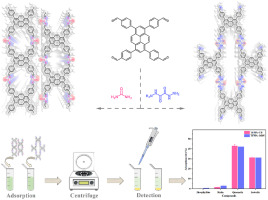Abstract
Isolation and enrichment of flavonoids is difficult due to the complex active components in natural medicinal extracts, and one of the most effective methods is to design adsorbents with high adsorption capacity and excellent selectivity. Covalent organic frameworks (COFs) with a large specific surface area and adjustable pores are increasingly used as adsorbents. Here, two imine-linked COFs (TFPPy-CB and TFPPy-ODH) consisting of 1,3,6,8-tetrakis(4-formylphenyl)pyrene, carbamide, and oxalyl dihydrazide were synthesized using solvothermal methods. They were characterized by XRD, FT-IR, XPS, TGA, SEM, TEM, water contact angle, and N2 adsorption -desorption isotherms. These two highly crystalline COFs have good thermal stability, strong hydrophobicity, and large pore size. The adsorption results were fitted to the general-order model and the Langmuir model, indicating that monolayer adsorption is the dominant adsorption mechanism. At 45 degrees C, the maximum adsorption capacities of luteolin, quercetin, and rutin onto TFPPy-CB were 66.32, 67.85, and 10.69 mg/g, respectively, and onto TFPPy-ODH were 73.20, 70.83, and 9.76 mg/g, respectively. The thermodynamic properties (AH degrees and AS degrees >0, AG degrees <0) indicated that the adsorption of flavonoids onto COFs was a spontaneous endothermic reaction. The COFs exhibited reusability after 5 adsorption-desorption cycles and selectivity for flavonoids in the presence of alkaloid interference. Furthermore, physicochemical properties and adsorption data revealed that the interaction between COFs and flavonoids involved hydrophobic interactions, hydrogen bonding, and 7C-7C interactions. These materials had an extremely short adsorption equilibrium time (less than 10 min) and could potentially be used as adsorbents for the rapid enrichment of flavonoids in complex systems.

Published in MICROPOROUS AND MESOPOROUS MATERIALS,Volume348;10.1016/j.micromeso.2022.112333,JAN 15 2023


